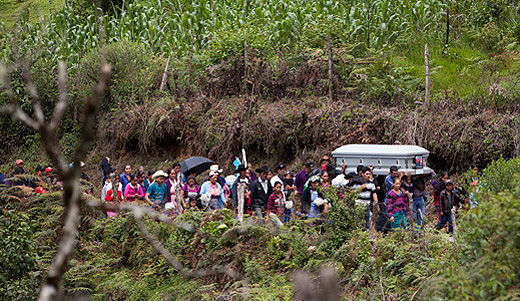
Charles Krauthammer, the right wing columnist, pooh-poohs the idea that the child migrants in South Texas, who have been coming in mostly from Guatemala, Honduras and El Salvador, are fleeing violence and poverty. “Nonsense” says Krauthammer, “when has there ever not been violence and poverty in Central America?”
U.N.H.C.R. (the UN Refugee Agency) interviews found that more than for the other countries, the Guatemalan children mentioned poverty and hunger as motivators. Also, 48 percent of the Guatemalans interviewed were indigenous people, of Native American ethnicity and language, instead of Spanish speaking “Latinos.” The overall population of Guatemala is said to be about 40 percent indigenous, perhaps an underestimate.
The poverty and suffering of Guatemalans, and especially indigenous Guatemalans, is rooted in long term U.S. policy in the region.
After a long history of U.S. allied military dictatorships and a popular uprising, Guatemala elected a progressive civilian president, Juan Jose Arevalo, in 1944. He and his successor, Jacobo Arbenz, implemented pro-labor, pro-peasant and pro-indigenous policies. Major projects of land reform were accompanied by a huge expansion of labor rights.
Although neither Arevalo nor Arbenz were Marxist revolutionaries, the Guatemalan Party of Labor, the country’s communist party, supported the changes. But these policies menaced the interests of the U.S. United Fruit Corporation, which under previous governments had received huge concessions.
In United Fruit’s corner was the United States – on general anti-communist principles but also because two important U.S. political figures, the Dulles brothers (Secretary of State John Foster Dulles and CIA Director Allen Dulles) had connections to the firm.
So in 1954, the CIA engineered a military coup that overthrew Arbenz. There followed a long series of brutal right wing governments, military or military-backed, that rolled back all the Arevalo-Arbenz reforms and did their best to crush resistance from unions, indigenous people, peasants and the left. The total death toll was around 200,000 people. One of the worst dictators, General Efrain Rios-Montt, heavily supported by the Reagan administration, carried out a genocidal campaign against the indigenous population.
Rios-Montt was overthrown in 1983, and in 1996 the Guatemalan government signed a peace agreement with leftist insurgents, but the country has remained very violent and its indigenous population has remained poor. During the decades of military dictatorship, state security institutions were thoroughly corrupted and have been infiltrated by criminal elements. This has thwarted the development of democracy and basic social justice. For example, recent efforts to convict Rios-Montt for his crimes of genocide have been foiled by shady machinations within the judiciary. The current president, Otto Perez Molina, is a military man who has been accused of violations of human rights during the Rios-Montt presidency. So Guatemala’s murder rate, especially of women, remains sky high, its people, except for a few super rich landowners and businessmen, remain poor, and its indigenous population remains oppressed. This is why Guatemalan indigenous and Latino children show up at the U.S.-Mexico border.
What about Honduras? The country has the highest murder rate in the world, but it was not always so. Honduras has been poor for a long time, but under former President Manuel Zelaya, who was implementing policies similar to those that the Arevalo-Arbenz governments had initiated in Guatemala, things were improving. But in June 2009, Zelaya was overthrown by a military coup that had been abetted by right wing U.S. politicians, and whose resulting government was and is supported by the United States. Since the coup, there has been widespread violence against journalists, peasant and labor organizers, and gay, lesbian and transgendered people, as well as a continuous rise in crime and violence in the society. The current president, Juan Orlando Hernandez, elected in a fishy election last year, has done his best to weaken an already weak and corrupt judiciary.
El Salvador elected a center-left president, Mauricio Funes, in 2009, and a figure more to the left, former FMLN guerilla Comandante Salvador Sanchez Ceren, earlier this year. Both have tried to tackle poverty and injustice, but the obstacles have been huge. Under Funes, the sky high gang violence problem temporarily declined due to a government-facilitated gang truce, but this appears to have broken down and the violence is rising again. But let us not forget that the gang problem in El Salvador started in Los Angeles, where children of Salvadoran refugees, living in poverty and insecurity, got sucked into the already existing gang life, and then were deported back to El Salvador.
And then there is the “war against drugs,” which the drugs seem to be winning. Central America and Mexico are the battlefields, but the demand is mostly in the U.S.A., whence come the weapons.
Underlying all is a regional pattern of oligarchic landowners, businesspeople and military despots, bearers of a racist, right wing ideology that approaches fascism. These people protect the interests of U.S., Canadian and other major corporations, and are the ones with whom the U.S. government and military have usually preferred to work. The U.S. has overthrown progressive governments again and again to protect this arrangement. When the workers, poor, women, youth and indigenous and Afro-Caribbean minorities break this cycle, everything will begin to change.
This is what Krauthammer and his ilk will never admit.
Photo: Relatives carry the coffin containing the remains of Gilberto Francisco Ramos Juarez, a Guatemalan boy whose decomposed body was found in the Rio Grande Valley of South Texas. The 15-year-old Guatemalan migrant was buried in his hometown, San Jose Las Flores, Guatemala, July 12. Moises Castillo/AP

MOST POPULAR TODAY

Zionist organizations leading campaign to stop ceasefire resolutions in D.C. area

High Court essentially bans demonstrations, freedom of assembly in Deep South


Afghanistan’s socialist years: The promising future killed off by U.S. imperialism

Communist Karol Cariola elected president of Chile’s legislature






Comments